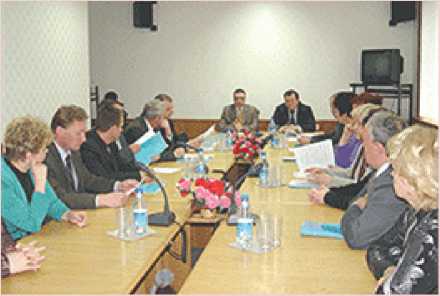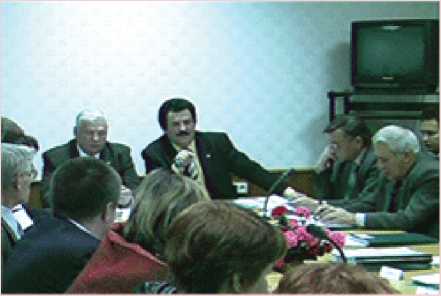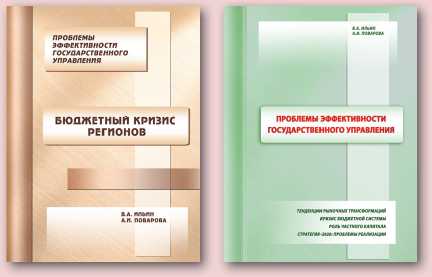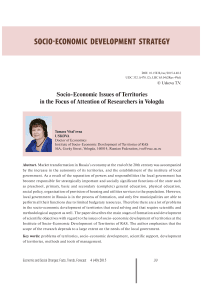Socio-economic issues of territories in the focus of attention of researchers in Vologda
Автор: Uskova Tamara Vitalevna
Журнал: Economic and Social Changes: Facts, Trends, Forecast @volnc-esc-en
Рубрика: Socio-economic development strategy
Статья в выпуске: 4 (40) т.8, 2015 года.
Бесплатный доступ
Market transformation in Russia’s economy at the end of the 20th century was accompanied by the increase in the autonomy of its territories, and the establishment of the institute of local government. As a result of the separation of powers and responsibilities the local government has become responsible for strategically important and socially significant functions of the state such as preschool, primary, basic and secondary (complete) general education, physical education, social policy, organization of provision of housing and utilities services to the population. However, local government in Russia is in the process of formation, and only few municipalities are able to perform all their functions due to limited budgetary resources. Therefore there are a lot of problems in the socio-economic development of territories that need solving and that require scientific and methodological support as well. The paper describes the main stages of formation and development of scientific objectives with regard to the issues of socio-economic development of territories at the Institute of Socio-Economic Development of Territories of RAS. The author emphasizes that the scope of the research depends to a large extent on the needs of the local government.
Problems of territories, socio-economic development, scientific support, development of territories, methods and tools of management
Короткий адрес: https://sciup.org/147223751
IDR: 147223751 | УДК: 332.1(470.12) | DOI: 10.15838/esc/2015.4.40.2
Текст научной статьи Socio-economic issues of territories in the focus of attention of researchers in Vologda
In December 1990 the Vologda Scientific-Coordination Center (VSCC) was established: nowadays – the Institute of Socio-Economic Development of Territories of the Russian Academy of Sciences. Its formation occurred in the period of transformation from a planning into a market economy. The specific characteristics of this stage of the country’s socio-economic development were the following: transition of the greater part of state property into private in the course of privatization, an increase in the role of small business, formation of a basis for finance-credit and banking systems, institutional, political structures, etc. However, along with the positive features of that period the reform was accompanied by severe crises, including: deep disorder of the reproduction mechanisms; increased differentiation of territories; a lack of own institutional infrastructure for expanded reproduction. The mechanism of market competition involved the division of regions by their competitive advantages and disadvantages. The regions with different economic structures and mentality of the population and the authorities adapted to market differently. At the same time, the federal government declared economic independence of Russian subjects; the institute of local self-government was formed. The responsibility for socioeconomic development of the territory was shifted to regional authorities.
The state socio-economic policy was based on borrowing “foreign recipes” [3], did not take into account the specifics of the country’s development in the previous decades. Such policy resulted in a number of negative trends in the social sphere and economy. These problems were characteristic of the Vologda Oblast, undergoing, like other regions, very difficult times.
The negative dynamics of most socioeconomic indicators was caused by the liberal model of the economic reform. Its main tool is to limit the state’s role as an active subject of economic power and reduce its functions to the control over the dynamics of monetary aggregates [3]. The government claimed the necessity to refuse from the state regulation of socio-economic processes.
However, the national economy’s functioning in the market conditions and its integration into the world economy required new, science-based forms and methods to manage socio-economic processes. The scientific and methodological support of these objectives underlined the activity of the Department of the Issues of Socio-Economic Development and Management in Territorial Systems – the leading research department of the Vologda Scientific-Coordination Center.
Today the elaboration of scientific and methodological foundations for the regional economy development in the conditions of dynamic external and internal environment, methods and tools to manage territorial development is a priority in the economic studies conducted by ISEDT RAS. The activity of the Department of the Issues of Socio-Economic Development and Management in Territorial Systems is aimed at the enhancement of the theoretical and methodological foundations and methodological tools to manage a region, municipalities (cities, districts, settlements) and economic entities; the organization of regular socio-economic monitoring; the scientific substantiation of the factors and methods to manage sustainable development of territorial systems; the modernization of administration in the region at a new stage of reforming the local self-government, etc.
What are the main stages of formation and development of scientific research in the territorial development management in ISEDT RAS?
In our opinion, we can single out 3 stages.
The first stage covered the 1991–2000 period. The academic institution set the task to elaborate the guidelines and tools for adaptation of the management systems of regional and local level to the market economic conditions. In these years the research associates of the Institute studied the theory and methodology of socioeconomic processes, tested methodological tools on the materials of the Vologda Oblast, formed the research base and elaborated research topics. Following the recommendations of leading Russian scientists-economists, such as L.I. Abalkin, A.G. Granberg, A.E. Kogut, D.S. Lvov, A.I. Tatarkin, V.N. Lazhentsev, etc.[4, 8, 9, 14], the employees of the Institute under the scientific supervision of Doctor of Economics V.A. Ilyin developed the concepts for socio-economic development of the Vologda Oblast and several districts already in the early 1990s. We should acknowledge the help of power structures of different levels. It is, primarily, specialists of the Vologda Oblast Government, the City Vologda Administration and administrations of Vologodsky, Cherepovetsky, Sokolsky and Gryazovetsky municipal districts. The recommendations, suggestions and conclusions obtained at the Institute were tested there.
There was fruitful cooperation on the search for ways to develop the city with the Vologda City Administration. To make an integrated assessment of the residents’ satisfaction with living conditions and activities of local governments and elaborate recommendations on improvement of the city’s socio-economic policy the Institute carried out the monitoring of living conditions in the city of Vologda that time.
Since 1994 this monitoring has been conducted annually. 800 residents participate in the survey. The distribution of respondents by age and gender corresponds to the general population. To consider the characteristics of living conditions on the territory of the city we conduct the survey by districts, four of which comply with the electoral districts: Eastern, Western, Central, Zarechny. Besides, the composition of the districts includes the ones most remote from the city center: Losta, Luk’yanovo, Priluki and the village of Molochnoe.
The Institute has created the unique database that makes it possible to analyze socio-economic processes and the change in the city residents’ mood in different periods of economic development. In 2012 the Database state registration certificate was obtained.
During the economic research of that time the Vologda scientists proved the need to manage the socio-economic development of territories on the basis of a strategy; proposed to organize planning of socioeconomic development of the city of Vologda taking into account the experience of European cities and increasing competition for investment between municipalities; elaborated guidelines on the adjustment of the current socio-economic policy; urged the conduct of the regular monitoring of socio-economic development and the creation of the incentive system for municipal employees. In the late 1990s the scientific staff of the Institute presented a long term forecast for socio-economic development of the city of Vologda. The scientists’ achievements formed the basis for the adopted Concept for Socio-Economic Development of the city of Vologda up to 2010 .
The main scientific results of that period are reflected in several publications, including the monographs: “Vologda Oblast: Movement to the Market” (V.A. Ilyin, A.A. Pashko, M.F. Sychev; edited by P.A. Usachev); “Living Conditions of the Population: Assessment and Management Issues” (V.A. Ilyin, E.M. Zhirnov, A.S. Yakunichev); “Strategy for the Municipal Formations Management” (group of authors under the supervision of V.A. Ilyin, A.S. Yakunichev).
The next stage of development of researches in the management of socioeconomic processes of territories (2000– 2010) coincided with the period of local self- government reformation, its transition to a two-level model, extension of the powers and the responsibilities of local governments. The economy of the regions demonstrated a steady growth until the 2008–2009 financial crisis. The Vologda scientists got involved in the process of working out the theoretical and methodological bases for the territorial development management. In these years the unique methods and tools of administration were created and tested in the Northwestern Federal district. This was facilitated not only by the accumulated experience, but also by the significant expansion and strengthening of scientific relations of ISEDT RAS with the leading economic institutes of the Russian Academy of Sciences (Institute of Problems of Regional Economy of RAS; Institute of Economics, Ural Branch of RAS; Institute of Socio-Economic and Energy Problems of the North Komi Scientific Centre, Ural Branch of RAS; Institute of Economics of Karelian Scientific Centre of RAS, Central Economics and Mathematics Institute of RAS; Institute of Economic Forecasting of RAS, etc.) and the development of friendly contacts with Russian scientists. Thus, the range of studies on the territorial development problems was expanded and the quality and the effectiveness of research projects were improved and ultimately the scientific school “Theory and methodology of management of sustainable socioeconomic development of regional systems” was formed.
Due to the importance of the tasks performed by local governments, the staff of the Institute carries out the annual monitoring of socio-economic development of municipal district and since 2006 – the monitoring of the local government reform. It is aimed at evaluating the results of the local government reform, identifying the problems and working out the recommendations on the increase in efficiency of regional and municipal authorities’ activity. The monitoring is conducted on the basis of the questionnaire survey of heads in all Vologda Oblast municipalities (urban and rural settlements, municipal and city districts). The database provides an opportunity to identify changes in the development of this institution of power in the Russian Federation and critical problems, causes and trends in its development. In 2014 we received the Database state registration certificate.
The Vologda scientists were also focused on the issues to establish and optimize the management structure in the district and local self-governments, enhance the cooperation between authorities of different levels (region – district – settlement) according to the requirements of the law “On general principles of organization of the Russian Federation” (federal law no. 131) and improve the management of municipalities’ fiscal resources and promote the development of privatemunicipal partnership.
In addition to the issues to improve local self-government, the Institute employees studied the problems to manage sustainable development of territories, enhance their competitiveness and establish regional production clusters.
The main scientific results of the Department staff at the time were the following:
– development of the theory and the methodology to manage sustainable socioeconomic development of territories;
– scientific justification of the formation of the continuous planning system, comprising the elements of tactical (medium-term) and operational planning, capable to act as a mechanism for the strategy implementation;
– creation of the methodological tools for formation of the multilevel system of indicative planning of socio-economic development of territories and assessment of the effectiveness of socio-economic development of municipalities;
– elaboration of the methods, such as formation and implementation of the plan and the system to monitor socio-economic development of municipalities; assessment of the competitiveness and the sustainability of regional development; evaluation of the sustainability of socio-economic systems;
– substantiation of the algorithm to create industrial clusters; the scheme of local self-government organization, the models and the mechanisms to improve local governments’ activity; the conceptual approaches and the main directions to facilitate the management structure of local self-governments; the forms of interaction between regional, district and settlement authorities and public-private partnership, etc.
There was very productive cooperation with the administrations of Vologodsky District and Gryazovetsky District. The

Seminar in the Administration of Gryazovetsky District

VSCC Director V.A. Ilyin and Head of the administration of Vologodsky District A.V. Gordeev (from left to right)
study results, proposals and recommendations of the research associates were tested on the materials of these municipalities and repeatedly discussed at the seminars ( photo ). Their use helped the districts form the management system addressing many socioeconomic problems and hold high positions in the rating of the Vologda Oblast municipal districts.
The results of these studies are presented in the monographs, such as: “Monitoring of Municipalities Development” ( T.V. Uskova, A.N. Zuev, A.A. Smirnov ; under the scientific supervision of V.A. Ilyin ); “Indicative Planning of Municipalities Development” ( T.V. Uskova ); “Local Government in Rural Regions: Trends,
Problems, Prospects” (team of authors: V.A. Ilyin, V. I. Chirkov, T.V. Uskova, K.A. Gulin, D.P. Zharavin, I.N. Dement’eva ); “Local Self-Government in Regional Development” ( D.E. Amelin ); “Strategic Management of Socio-Economic Development of a Municipal Formation” ( D.P. Zharavin, N.A. Pakholkov ); “Mechanism of Investment Interaction between Business Structures and Local Self-Government” ( E.O. Orlova, P.M. Sovetov ); “Economy of a Rural District: State and Prospects” (V .A. Ilyin, A.V. Gordeev, T.V. Uskova, M.F. Sychev, K.A. Gulin ); “Management of Sustainable Development of a Region” ( T.V. Uskova ), etc. ( photo ).

The beginning of the third stage of the research in the problems to manage territorial development coincided with the 2008–2009 post-crisis period. This period was characterized by the significant slowdown in the economy, the lack of financial resources of the federal and regional budgets to meet current challenges. In these circumstances the responsibility for sustaining livelihoods, providing public services and forming local factors to strengthen regional and national economies was laid on the local authorities [5, 6, 10]. The role of local self-government in the sustainable development of territories increased considerably. The potential of territories was considered as one of the main resources of economic growth and competitiveness of the region. The regional authorities and local self-governments were focused on the development of this potential and its more efficient use. Taking into account these circumstances, the Department of the Issues of SocioEconomic Development and Management in Territorial Systems defined the task of scientific research that time.
The primary scientific objectives of the Department for 2010–2015 are to study the municipalities’ capacity to ensure sustainable development of the region, identify the methods to solve social-economic problems of local territories, enhance the efficiency of state and municipal management and improve the regional socio-economic policy.
The research, carried out in these years, revealed the low performance at all levels of government, allowed us to define the main directions to raise the efficiency of territorial development management, including through bettered regional socio-economic policy [10]. The list of proposals at the municipal level includes the organization of territorial self-government (TSG), the use of the mechanism of selftaxation of citizens as a form of improving the effectiveness of their participation in local self-government, the introduction of municipal-private partnership mechanisms and the formation of the effective districtsettlement interaction mechanism.
At the regional level it is advisable to focus primarily on the coordination of activities of federal, regional authorities and local self-governments and the creation of favorable conditions for socio-economic development in the municipalities to attract local private investment.
The regional policy of the federal center is directed to overcoming excessive socioeconomic differentiation of territories and encouraging more balanced spatial development of the national economy through the identification of each region’s advantages, the establishment and promotion of new agglomerations of dynamic economic growth. The regional policy should be focused on:
– development of agglomerations, support of competitive territories, which can contribute to more rapid growth of the country’s economy;
– creation of the system to reproduce the main parameters of territories’ competitive advantages;
– formation of the environment that stimulates and backs innovation and development;
– formation of internal sources of territorial development;
– development of social and engineering infrastructure of territories, ensuring equal access of the population to socially important services-DIN;
– promotion of population mobility;
– establishment of the system of government-business-population interaction to solve territorial problems [2, 13].
In this period the ISEDT RAS employees were interested in public-private (municipal-private) partnership as a tool to meet socio-economic issues of local territories. They paid much attention to the territorial economy management concept, based on the development of public-private partnership in the housing and utilities sector – a very significant and cost-intensive sphere [11].
The Vologda scientists tried to find the ways to increase the efficiency of financial, economic, recreational and tourist potential, critical for sustainable socioeconomic development of territories. The ISEDT RAS scientific staff studied mechanisms of investment attraction, issues of tourist infrastructure development and labor potential in this sphere to develop tourist potential of territories and encourage its more effective use. The accumulated materials allowed us to work out the strategy and the program for the tourist cluster development in the Vologda Oblast.
The modern economical development trends in the changing market conditions revealed the challenge of finding new ways and organizational and economic tools to achieve social well-being in the society. The promotion of social responsibility of business is one of these ways. The interaction of political, social and economic actors, based on the principles of social partnership, contributes to sustainable development of territories. Within framework of the research in the problem of social responsibility of business we identified the main stages of corporate social responsibility development and scientifically justified the directions of socially responsible behavior implementation.
The Department conducted a lot of studies on behalf of the Vologda City Administration aimed at increasing the efficiency of used potential of the city. We elaborated the draft strategies for the development of industry, construction industry, consumer market and consumer services.
In addition, in this period we worked out the strategies for socio-economic development of Babaevsky District and Vologodsky District that received very high evaluation of the expert community.
The most significant scientific results of the research in the problems of socioeconomic development of territories conducted by ISEDT RAS in this period were the following:
– development of theoretical and methodological foundations of regional socio-economic policy, efficiency of state and municipal management;
– creation of the author’s methods to evaluate the effectiveness of management of socio-economic development of municipalities and regional socio-economic policy towards municipalities; the level and the differentiation of socio-economic development of territories; the level of tourist infrastructure development; the state of housing and utilities services of municipalities; the social responsibility of business, etc.;
– elaboration of the methodological tools to assess the prospects for reducing differentiation of territories and forecast their consequences; the effectiveness of partnership projects at all stages of their life cycle (the attention is paid to the balance of all actors’ interests);
– scientific substantiation of the methodical recommendations to adjust the regional socio-economic policy;
– formation of the neural network model of socio-economic development of territories.
The results of the studied problems of socio-economic development of territories in 2010–2015 are presented in the monographs, such as: “Management of a Modern City: Directed Modernization” ( T.V. Uskova, A.N. Nesterov ); “Development of Productive Capacities ofaRural Area”( T.G. Smirnova, S.A. Selyakova, E.N. Kozhina );
“Socio-Economic Resource of Tourism” ( T.V. Uskova, L.V. Dubinicheva, V.S. Orlova ); “Consumer Market: State and Prospects” (team of authors under the supervision of T.V. Uskova ); “SingleIndustry Town: Development Management” (team of authors under the supervision of T.V. Uskova ); “Socio-Economic Problems of Local Areas” ( T.V. Uskova, N.V. Voroshilov, E.A. Gutnikova, S.A. Kozhevnikov ); “Regional Competitiveness” ( A.S. Barabanov ; under the supervision of Doctor of Economics T.V. Uskova ); “Housing and Utilities Services of a Region: State, Problems, Perspectives” ( S.A. Kozhevnikov ; under the supervision of Doctor of Economics T.V. Uskova ), etc.
The results of the research formed a basis for the theses. The thesis for a Doctor’s degree and 7 theses for a Ph.D.’s degree have been defended on this subject.
During the formation of the institute of local self-government in the Russian Federation, we witness new approaches to the management of socio-economic development of municipalities. Possessing financial and economic resources, the municipalities can define the prospects and promote the development options

that are most conducive to the solution of problems of socio-economic development of territories. These opportunities, to a certain extent, depend on the state economic policy. However, the scientific research reveals its low efficiency. The government economic policy is of liberal nature. The complex financial and economic measures implemented by the RF Government worsen the budget crisis of regions and municipalities.
This statement is confirmed by the results of the research in the performance of public administration initiated by the ISEDT RAS employees in 2009 under the supervision of Doctor of Economics V.A. Ilyin and presented in the publications [1, 7, 12] ( photo ).
The deepening of the research in the effectiveness of management at all levels of government is one of perspective scientific

directions in the following period. ISEDT RAS is to develop the theoretical and methodological foundations and the practical tools to assess the performance of public (municipal) administration in the RF subjects (municipalities), including in terms of subsystems of the economy. The research associates have the task to extend the range of applied methodological tools of scientific research, develop mathematical and economic-mathematical modeling methods.
Список литературы Socio-economic issues of territories in the focus of attention of researchers in Vologda
- Ilyin V.A., Povarova A.I. Problemy effektivnosti gosudarstvennogo upravleniya. Byudzhetnyi krizis regionov: monografiya . Vologda: ISERT RAN, 2013. 128 p.
- Ilyin V.A., Uskova T.V. Metody preodoleniya prostranstvennoi sotsial’no-ekonomicheskoi differentsiatsii . Federalizm , 2012, no. 3 (67), pp. 7-18.
- L’vov D.S. Ekonomika razvitiya . Moscow: Ekzamen, 2002. 512 p.
- Osnovy mestnoi sotsial’no-ekonomicheskoi politiki: rekomendatsii po razrabotke i prakticheskoi realizatsii . Ed. by A.E. Kogut. Saint Petersburg: ISEP RAN, 1995. 142 p.
- Potentsial razvitiya munitsipal’nykh obrazovanii: soderzhanie, otsenka, upravlenie (na materialakh Respubliki Komi) . Ed. by V.N. Lazhentsev. Syktyvkar: KNTs UrO RAN, 2008. 344 p.
- Problemy i puti perekhoda munitsipal’nykh obrazovanii k innovatsionnoi samoorganizatsii: materialy nauch.-prakt. konf., g. Velikii Novgorod, 25-26 noyabrya 2005 g. . Ed. by V.L. Makarov. Veliky Novgorod, 2005. 240 p.
- Ilyin V.A., Povarova A.I. Problemy effektivnosti gosudarstvennogo upravleniya. Tendentsii rynochnykh transformatsii. Krizis byudzhetnoi sistemy. Rol’ chastnogo kapitala. Strategiya-2020: problemy realizatsii: monografiya . Vologda: ISERT RAN, 2014. 188 p.
- Rossiya -2015: optimisticheskii stsenarii . Ed.by L.I. Abalkin. Moscow: MMVB, 1999. 416 p.
- Samorazvivayushchiesya sotsial’no-ekonomicheskie sistemy: teoriya, metodologiya, prognoznye otsenki. T. 1: Teoriya i metodologiya formirovaniya samorazvivayushchikhsya sotsial’no-ekonomicheskikh sistem . Ed. by A.I. Tatarkin. Moscow: Ekonomika, 2011. 308 p.
- Uskova T.V., Gutnikova E.A. Problemy funktsionirovaniya i napravleniya razvitiya instituta mestnogo samoupravleniya . Federalizm , 2012, no. 1, pp. 127-136.
- Uskova T.V., Kozhevnikov S.A. Upravlenie ekonomikoi regiona na osnove partnerskogo vzaimodeistviya organov vlasti i biznes-struktur . Ekonomicheskie i sotsial’nye peremeny: fakty, tendentsii, prognoz , 2014, no. 6 (36), pp. 34-46.
- Uskova T.V., Povarova A.I. Problemy effektivnosti gosudarstvennogo upravleniya . Sbornik nauchnykh dokladov i soobshchenii Uchenogo soveta ISERT RAN. Vyp. 9 . Vologda: ISERT RAN, 2014. Pp. 4-58.
- Uskova T.V. Upravlenie ustoichivym razvitiem regiona . Vologda: ISERT RAN, 2009. 355 p.
- L’vov D., Makarov V., Kleiner G. Ekonomika Rossii na pereput’e vekov . Moscow, 2000. 88 p.


